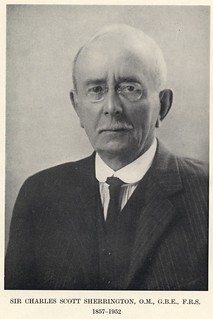- Correspondence Details
-
Sent From (Definite): Sir Charles Scott Sherrington - Oxford
Sent To (Definite): Prof Derek Denny-Brown - LondonDate: 17 May 1932 - Current Holder(s)
-
Returns Denny-Brown's 'interesting critical glance at Pavlov' - note in D-B's hand: 'my review of... Pavlov' (Denny-Brown, Theoretical Deductions...' Journal of Neurological Psychopathology 13, 1932), notes that Lodge has also recently sent him a letter critical of Pavlov. Quotes passage of Lodge's complaints re: applicability of the term 'reflex' to Pavlov's experiments. Sherrington's comments on the 'folk' understanding of the term and the difficulty behavioursists will have in altering it. Sherrington's own critical comments on Pavlov - cites Troland (1928), emphasises that Pavlov 'does not seem to realize the large role played by 'trial + error' learning in the formation... of animals' natural habits.' - mentions the 'maze test' in this regard, suggests Thorndike (1911) and Yerkes addresss this problem much more thoroughly, inc. diagram of q. re: how reflex conditioning links are formed. Re: MS sent to Sherrington by Denny-Brown - that they are 'merely suggestions'.
- No links match your filters. Clear Filters
-
Quotes
 Oliver Lodge
Oliver Lodge
Description:Quotes a non-extant letter from Lodge to Sherrington: ''Oddly Lodge - Oliver L. - wrote me criticizing P[avlov]. last month. It may entertain you to hear how a scientist - not a biologist - regards the P. doctrine. "He is (i.e. P. is) converting all our actions into reflex actions!" "That a dog's salive [sic] should flow when shown a circular patch or at a tuning fork's sounding 256 vibrations p. sec. is natural enough if the repetition has been frequent. But to call this a reflex is begging the question: the stimulus would be without effect on an animal without a cortex, & therefore no-one can say it is purely reflex. The psychic part is merely denied, illegitimately. That it is psychic is shown by making the patch eliptical or changing the note to 264 vibrations makes the stimulus ineffective. I cannot imagine the slight variation differently affecting a tone reflex." And so on. The interest of this is that it shows what a well-educated layman regards as the meaning of the word 'reflex.' I think that as so understood it has become too ingrained for P. & the behaviourists to alter it.'











